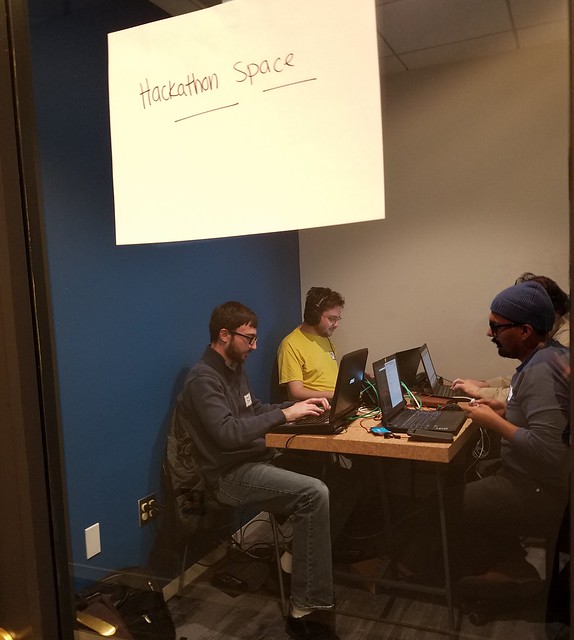News Highlights
- The hackathon helped increase the public and private sector collaboration to develop the innovation ecosystem in Fairfax County, a key strategy in our plan to grow and diversify the economy.
- The event also tested VDOT's new data portal that is part of the agency's overall drive towards innovation.
It’s no secret that the D.C. region suffers some of the worst traffic congestion in nation—second worst in the U.S. to be precise, according to the Texas Transportation Institute’s annual rankings.
Can technology create solutions to get traffic flowing more freely? This is what Fairfax County and the Virginia Department of Transportation asked when they brought together software and app developers, data scientists and transportation experts this month.
To find out, the county and VDOT held a transportation hackathon on Nov. 16-17, at Refraction, a tech co-working space in Reston. More than 100 people participated in the intense, two-day sprint to write code for apps, programs and technology to improve traffic tie ups, safety and mobility.
The hackathon was also intended to spur the development of new technologies and startups, a key strategy in the county’s plan to grow and diversify the economy.
“The whole event was about growing the innovation ecosystem and getting entrepreneurs, tech companies, government and people involved in infrastructure into one room to think differently about how we tie together,” said Eta Davis, Fairfax County’s economic initiatives coordinator.
It also was designed to test VDOT’s new data portal that’s part of the department’s push to innovate. The portal serves up real-time information from traffic signals, sensors, dynamic message signs and more.
“We wanted to really focus on big data to see what we can do with the data we have available from VDOT, as well as Fairfax County, U.S. DOT and others,” said Virginia Lingham, special assistant to the state agency’s chief of innovation.
Eleven teams competed for cash prizes up to $3,000. The competitors included individuals, established tech firms and George Mason and Old Dominion University students.
Check out the #MasonScience @ggsdepartment team hard at work at the #HackFairfax #DCTech with @VaDOTNOVA. Cheer teams on later today as they present solutions to mobility, safety, and congestion challenges in @fairfaxcounty. #MasonSolveX pic.twitter.com/9QdUdW3MbO
— College of Science (@GMU_COS) November 17, 2017
The teams produced ideas that ranged from employing artificial intelligence and machine learning to predict congestion or accidents to an app to help people who are blind safely cross the street to using big data to identify what makes intersections safe or find trends or hotspots to improve safety.
These innovations were evaluated on criteria that included their creativity, likelihood for commercialization and use of data. Judges represented the tech industry, academia and government and included Virginia Deputy Secretary of Technology Anthony Fung.
Getting down to the final hours... @VaDOT @fairfax @alltrafficsol #dctech #HackFairfax 🚗🚙🚌 pic.twitter.com/xt2wBsgPfb
— stringsAsFactors (@NotFakeBrendan) November 17, 2017
While two days wasn’t enough time to create market-ready products, the hackathon was a success, officials said.
Really impressed with what the hackers put together in less than 48 hours at the Transportation & Mobility Hackathon! Awesome work! #HackFairfax #dctech @fairfaxcounty @refractionpt @VaDOT @VaDOTNOVA pic.twitter.com/a9H406Z7A4
— John Foust (@johnfoustva) November 17, 2017
“There are great ideas here that challenge us,” said VDOT Chief of Innovation Rob Cary. “It certainly challenges us to think about how we can get more data out there.”
He pointed to other data sources, like livestream E-ZPass toll and travel time information, that could be added to the portal to fuel creative consumer apps.
As result of this first event in Fairfax, VDOT plans to hold hackathons in Hampton Roads, Richmond, Roanoke and Blacksburg, Cary said.
“We design, maintain operate a system of roadways, but we have a lot of data that others can do fantastic things with,” said Cary. “And I think you saw great examples of that today.”
For the county, the hackathon fostered collaboration between the public and private sectors that can help make Fairfax an innovation hub, and the event injected the startup mentality into county government.
“We were hoping that by working together we could educate the folks in the room about how government works and help the government folks in the room think differently,” Davis said. “How do we incorporate some of that entrepreneurial spirit in how we do business as government.”
James Quigley, who leads the Reston-based tech company GoCanvas, agrees.
“I also represent, and have been passionate about, this collaborative work on the public side,” said Quigley who serves on the county’s Economic Advisory Commission.
He said the hackathon was an example of this shared focus on innovation that’s happening across the region.
“I think you’re going to feel more and more of this energy,” Quigley said. “And the realization that it happens in urban centers, and it happens together.”
To this point, the hackathon wouldn’t have been a success without the many partners that made the hackathon possible, including Refraction, 1776, Smart City Works, George Mason University and Virginia Tech. Financial support was provided by Northern Virginia Chamber of Commerce, Qlarion and Reston Chamber of Commerce, and lunch was provided by Le Pain Quotidien.
###


